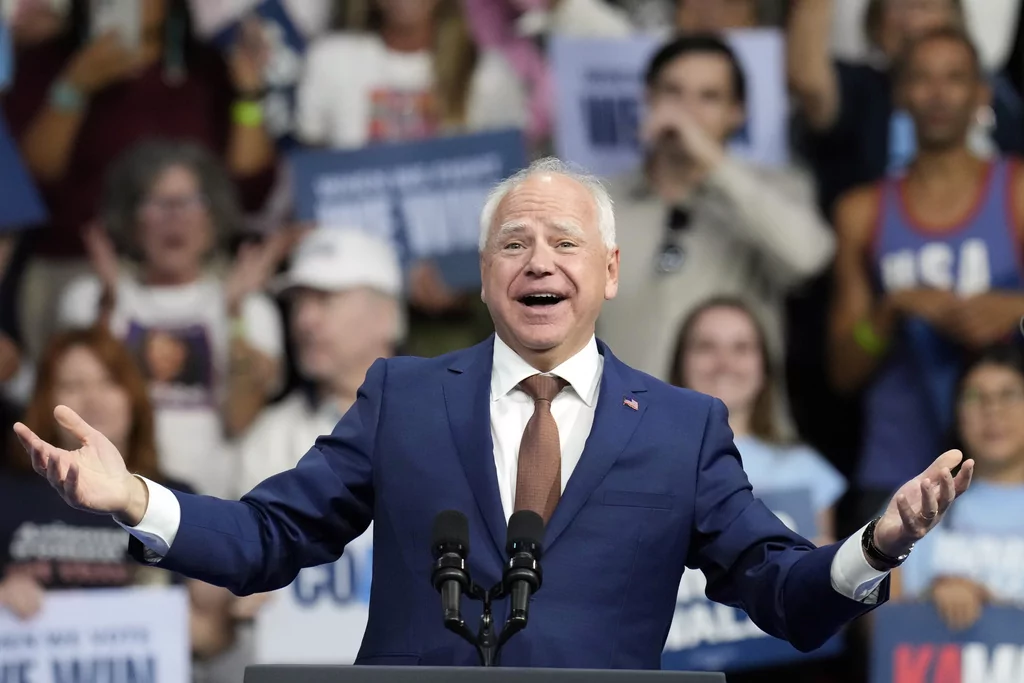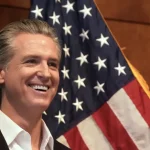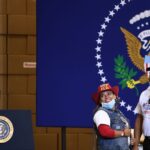

Republicans are doubling down on accusations that Gov. Tim Walz’s (D-MN) long history with China presents political liabilities for the Democratic vice presidential candidate to take on the foreign adversary should he be elevated to the White House.
As a 1989 college graduate and Army National Guard member, Walz embarked to China through a Harvard University-affiliated program to teach English and U.S. history and later operated a business organizing trips for U.S. students. Walz has visited the country 30 times over the decades by his own estimation, and he went back for his honeymoon with his wife.
Now, Republicans are scrutinizing how his extensive time in the communist nation may have influenced his foreign policy stances or whether he may be reluctant to confront Chinese aggression as vice president.
“I’m not sure what taking over 30 trips to China, including for his honeymoon, says about Tim Walz’s posture towards China,” Rep. Mark Green (R-TN), House Homeland Security Committee chairman, told the Washington Examiner. “But perhaps if the Harris-Walz campaign were willing to take questions from reporters, we could find out.”
The Harris-Walz campaign did not respond to a request for comment.
The campaign has previously rejected such criticisms and instead pointed to Walz having condemned China’s human rights record.
“Republicans are twisting basic facts,” campaign spokesman James Singer recently told Reuters.
He added that Walz “fought for human rights and democracy and always put American jobs and manufacturing first.”
Republicans labeled Walz joining the Democratic ticket as a gift to China. As the GOP finds its footing on campaign attacks for someone previously unknown on the national stage, the criticism of China appears to be here to stay.
Sen. Tom Cotton (R-AK), a China hawk who sits on the Senate Intelligence and Armed Services committees, suggested Walz’s numerous trips to China were funded by Beijing and represented an “attempt to cultivate future U.S. leaders.”
Walz and his allies, however, see his extensive relationship as a benefit to combat China.
Walz’s 1989 trip to China occurred when the infamous pro-democracy Tiananmen Square protests broke out, straining China’s relations with many other countries, including the United States.
After returning to the U.S., Walz and his wife started Education Travel Adventures to facilitate summer trips for high schoolers in the U.S.
At a congressional hearing in 2009 marking the 20th anniversary of the Tiananmen Square massacre, which Walz intentionally coincided with his wedding anniversary, Walz testified it was vital to remember the role protesters played against their government.
“To watch what happened at the end of the day on June 4 was something that many of us will never forget, we pledge to never forget, and bearing witness and accurate telling of history is absolutely crucial for any nation to move forward,” Walz told the Congressional-Executive Commission on China, which he was a member of.
When Walz first began visiting China, U.S.-China relations were not as adversarial, as the two nations actively tried bolstering ties for economic interests.
Still, since his first trip to the country roughly 3 1/2 decades ago, Walz has, at times, made eyebrow-raising remarks for conservatives that are receiving fresh scrutiny — not unlike his liberal record as governor that Republicans have homed in on.
Although Walz has long advocated improving U.S.-China relations, he has also been critical of human rights abuses and the Chinese government while showing affection for its people. He told a Nebraska newspaper in 1990 that if China “had the proper leadership, there are no limits on what they could accomplish.”
He heralded its citizens as “kind, generous, capable people” who “just gave and gave and gave to me.”
CLICK HERE TO READ MORE FROM THE WASHINGTON EXAMINER
Morgan Ortagus, a State Department spokeswoman under former President Donald Trump, opined that if “Walz has his way, our China policy will be the weakest in generations.”
“This should and will scare our Asian allies,” Ortagus posted to social media, referring to China’s aggression toward Taiwan. “The threat of China will be the next administration’s No. 1 national security challenge. The Harris-Walz campaign must answer real and serious questions on their CCP policy.”






